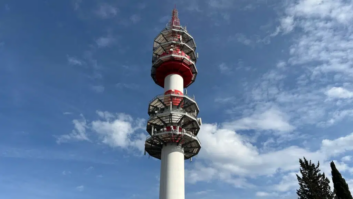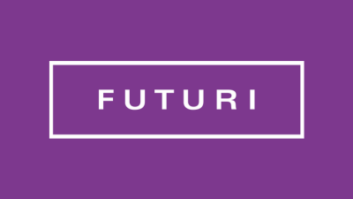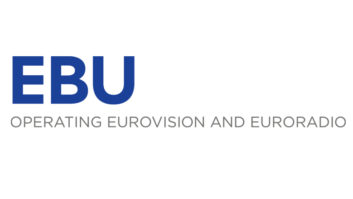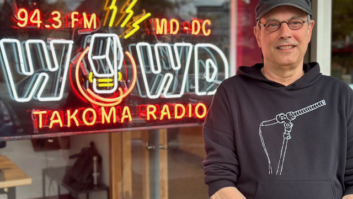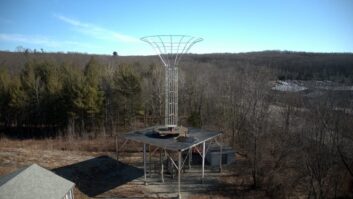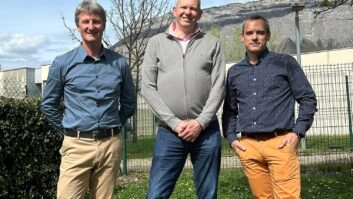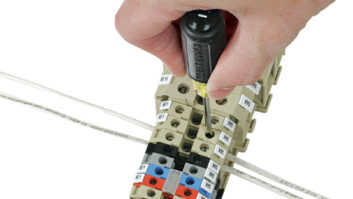
PARIS — Friday June 10 sees the Euro 2016 finals tournament kick off in the Stade de France, Paris with France taking on Romania. Over the following month, 51 matches will be played at various venues across France, with the final taking place on July 10 in the capital.
This is the third time France has hosted the final stages of the UEFA European Football Championship — known to most as UEFA Euro 2016.
In fact, France is an appropriate location, because the idea of the championships originated with a Frenchman, Henri Delaunay. He became the first general secretary of UEFA and the trophy that the tournament winners receive is named in his honor.
HOST BROADCASTER
Host broadcaster — for both radio and television coverage — is UEFA itself. As part of that operation, UEFA will offer a radio service via its Livex on-demand service, Livex Radio. This will be a multilingual web-based audio repository, delivered though a password-protected interface accessible via FAME (an integrated platform designed to manage all UEFA football management and administration needs).
Livex Radio will contain selected audio clips, available as MP3 files, including clips of match commentary, additional programming features, press conferences, interviews and so on. Some material will be supplied to UEFA Broadcast Partners with a transcript. As it stands UEFA has 18 takers — with more expected to also take the service, which will start June 6.
At UEFA Euro 2012, 1,737 radio clips were downloaded, with 637 related transcripts downloaded — translating to over 20 GB of MP3 files.

For listeners in the United Kingdom, the BBC will be covering most of the games either on Radio 5 live or Radio 5 live Sports Extra. “We will be sharing the same studios in Paris as our television colleagues and most of our programs will be presented from there,” explains Radio 5 live Assistant Editor Matthew Allen. “Although the majority of our commentaries will be coming live from each ground, there will be a few that will originate off tube from either Paris or our studios in Salford.”
Allen says that for Northern Ireland’s and some of Wales’ games there will be a simulcast. “The same commentary team will appear on Radio Ulster and Radio 5 live. This same arrangement will be in place for games involving Wales, except when they play England. For that match there will be two separate commentaries on Radio Wales and 5 live. We will have pundits at the matches and at our studio in Paris.”

Sabine Toepperwien is head of team for Germany’s
ARD Radio during UEFA Euro 2016.
LIVE AND RECORDED
The BBC will have reporters based with the England, Wales and Northern Ireland teams, covering press conferences, carrying out one-on-one interviews and providing all the latest news. To assist with the live and recorded material a small production and engineering team will operate from the BBC studio base, while one member of team will be working at the IBC.
German listeners will be able to listen to all 51 matches in Euro 2016 through coverage provided by ARD Radio.
“We have a team of eight commentators who are coming from different ARD stations,” explains Sabine Toepperwien, head of team, Germany’s ARD Radio for UEFA Euro 2016. “These are our group of commentators who normally cover the Bundesliga, but who also specialize in coverage of the national team.”
She explains that ARD’s production plan consists of three pillars: “The live coverage of all matches, a focused coverage of the German national team with a dedicated crew of journalists at the German team base camp, and last, but not least, general news and stories of France and the UEFA Euro 2016 tournament.”
For group matches and those not involving the German side, ARD will have one commentator on-site and, depending on the match, a reporter for interviews, news and summaries. For German team matches, the opening game and elimination games starting with the last 16 teams, the broadcaster will increase the number of people on-site.
“We booked the host broadcaster’s commentary positions and we will add our own technical setup that is regularly used for big events,” says Toepperwien. “After the final whistle of Euro 2016, it will be shipped on to Rio for the Olympic Games. This setup is mainly based on equipment and technology from Lawo.”

Joanne Cantwell is one of RTÉ’s presenting team during the events.
DEDICATED SPACE
She continues, “We will have dedicated space for ARD Radio at the IBC [International Broadcast Center] with a radio MCR, as well as office space and studios for editors for stories, news and summaries. Most of our programs will be produced and edited in France using our David DigAs and Digigram Iqoya systems.”
Toepperwien added, “In addition, using ARD’s audio file transfer network our content will be sent to Germany where member stations will have access to this audio material for their own use. The head of team, one of ARD’s correspondents for France and the central radio newsdesk, will also be based at the IBC. All of our audio signals will be routed via the IBC.”
RTBF will provide coverage of all 51 games for its French-speaking listeners in Belgium. “Our main commentators will be Thierry Luthers and Manuel Jous,” reports Michel Lecomte, head of RTBF-Sports.
“We will have one correspondent based at the IBC, but our commentaries will be fed by direct link back to the Brussels studio. Our plans also involve reporting from the training camp of the national side – with editing being carried out both on location and in Belgium.”

Damien O’Meara is behind the mic
for RTÉ at UEFA Euro 2016.
Irish state broadcaster, RTÉ is providing live coverage of all Republic of Ireland games. “Our main presenters will include Des Cahill, John Murray, Darren Frehill, Damien O’Meara and Joanne Cantwell, while John Kenny and Adrian Eames will provide commentary,” explains Ryle Nugent, group head, RTÉ Sport.
He reveals that the team will be based both in the studio in Dublin for reporting across radio news sports bulletins, dedicated radio coverage on “Saturday Sport,” “Sunday Sport” and “Game On,” and at the venues for live commentary and daily news desks.
“The aim will be to produce reports from both Republic of Ireland and Northern Ireland camps, including color from the Irish travelling army in host cities and fanzones across France.”
DIFFERENT APPROACHES
Up to the quarterfinal stage of Euro 2016, Croatian broadcaster Hrvatska Radiotelevizija (HRT) will only cover its national team’s games with live programming from France. However, clips from other games will be played during other sports broadcasts. For the quarter and semifinals, and the final itself, all games will be carried live by HRT.

Davor Lulić, journalist and sports coordinator for the Croatian radio, says that commentators (he and Srđan Fabijanac) will be at the grounds where Croatia is playing — other commentaries will be “off the tube” at the Zagreb studio headquarters. “We will be assisted by a technician in France, and as far as equipment is concerned, we will just need our own recorders and laptops, an ISDN line and FTP server. In that way, we will not require any kit from the host broadcaster — nor will we need any of the facilities offered by the IBC. Our broadcasts will be sent directly back to Zagreb, where our experts will provide analysis and comment.”
He goes on to say besides match commentaries, a reporter will be stationed at the Croatian team’s training camp, from where interviews and reports will be produced. “We plan to edit those programs on location in France, but also at the studio base. On-site we will use our Magix Samplitude editing equipment and utilize the FTP server for sending the material back to Croatia. For those programs edited in Zagreb, the editors will use our Netia system installed at the studio.”
He concludes, “Radio is still a very influential media and we will give our best efforts to provide the most comprehensive coverage for our listeners.”
Philip Stevens reports on the industry for Radio World from Essex, England.





